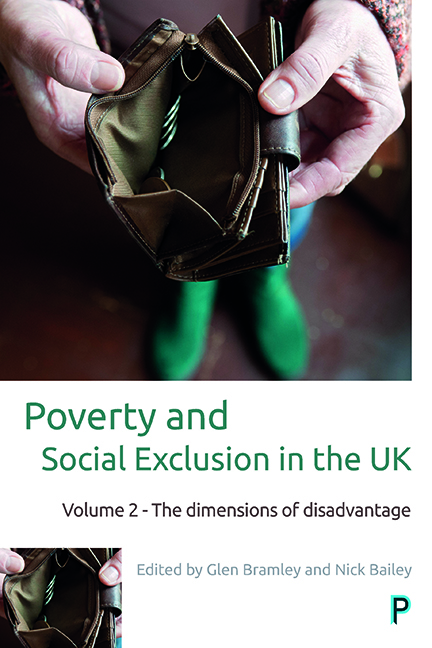fourteen - Conclusions and emerging themes
Published online by Cambridge University Press: 12 April 2022
Summary
Introduction
In this concluding section we attempt to provide some synthesis from the rich detail and insights developed across the preceding chapters. We do not attempt to simply reproduce the conclusions from each chapter. Rather, we have identified some larger themes which cut across the individual chapters and place the emergent findings from the PSE-UK 2012 study into a broader intellectual and policy context. This book presents predominantly quantitative findings from the PSE-UK survey structured thematically, mainly around the domains of social exclusion as set out in the Bristol Social Exclusion Matrix (B-SEM, see Levitas et al, 2007 and our Introduction), but with some additional themes around the measurement of living standards and wider well-being included.
In developing our narrative on the larger cross-cutting themes, we have a particular eye on the discourses about poverty, whether in popular debate, the media, academia or ‘policy communities’, and about associated issues of policy, including poverty-related targets and standards. The authors contributing to this volume are academics active in research on poverty and social exclusion, but also often actively contributing to these discourses and policy debates. While this volume and its companion (Dermott and Main, 2017) present the largest concentration of output and reflection from the PSE research, it should be recognised that there are other important published outputs (notably Lansley and Mack, 2015; Daly and Kelly 2015; edited collections of papers in Critical Social Policy (volume 36, issue 1, 2016) and Journal of Poverty and Social Justice (volume 22, issue 3, 2014), and the PSE website, www.poverty.ac.uk/pse-research), not to mention several TV programmes.
The centrality of poverty
The central message of this volume is that poverty is a reality, that we can measure it most effectively through the PSE's consensual deprivation approach, and that it still has very pervasive adverse effects on society which we can clearly document. Townsend's (1979) notion of poverty as the inability through lack of resources to participate in normal social activities continues to find strong public support and is reflected in the close relationship of exclusion from social activities with material poverty (as drawn out particularly by Mack in Chapter 1 and Bailey in Chapter 6).
- Type
- Chapter
- Information
- Poverty and Social Exclusion in the UK Vol 2The dimensions of disadvantage, pp. 343 - 362Publisher: Bristol University PressPrint publication year: 2017

